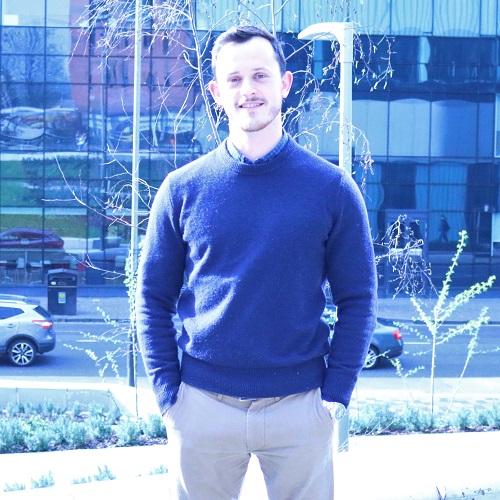PhD, MPhil Law
ApplyResearch opportunities
You can study a PhD or an MPhil in Law. A PhD in Law requires three years of full-time study full-time while an MPhil requires one year of full-time study.
The Strathclyde Law School also welcomes part-time PhD and MPhil students. Part-time research degrees provide a great opportunity to research in an area that relates to your profession. They also enable you to undertake postgraduate research and gain a PhD or MPhil without having to leave employment.
Our expertise
The Law School has expertise in the following areas:
- Access to justice & the provision of legal services
- Constitutional & administrative law
- Environmental law & governance
- Human rights
- Gender, Sexuality and the Law
- Criminal, Justice and Evidence
- Criminology
- Private law
- Technology Law and Regulation
- Intellectual Property Law
- Commercial law and International Commercial Law
- International and EU Migration Law and Governance
- Competition Law and Antitrust
- EU and UK Labour Law
- Public International Law
- Law and Society
- Finance Law
- Medical Law and Ethics
- Legal Theory
Further information on members of staff’s areas of expertise can be found under the supervisors' tab and on their staff profile pages.

The Place of Useful Learning
UK University of the Year
Daily Mail University of the Year Awards 2026
Scottish University of the Year
The Sunday Times' Good University Guide 2026

Read what our students say

Kathryn McKenzie
I have found the research community at Strathclyde to be very engaged. Anytime I feel the need to discuss a topic or ask for assistance on anything, I know there is someone I can turn to.

Graham Hamley
The support that I have received thus far at Strathclyde has been exceptional. I set up regular meetings with my supervisors, who help me define the focus and direction of my research.

Bryan Yan Wang
My supervisors always give me very helpful feedback. Instead of giving me direct answers, they always encourage me to the find the answer by myself, which is helpful in developing critical thinking skills and independent study skills.

Tania Nascimento
I’ve been lucky to have had the opportunity to choose my supervisors, so I chose the best! They have been a source of intellectual inspiration as well as giving fantastic guidance, advice, and support whenever needed. It is rare to find people in academia that let your ideas flourish and your voice be heard - I have been very lucky to find supervisors who possess all these traits.

Zi Yang
Strathclyde encourages critical thinking. Our master courses focus on discussion. During the seminars, students have the opportunities to share their views based on their cultural background, experiences and readings. This communication inspires the students to understand the world from different angles.
Fees & funding
All fees quoted are per academic year unless otherwise stated.
Entrants may be subject to a small fee during the writing up period.
Fees may be subject to updates to maintain accuracy. Tuition fees will be notified in your offer letter.
All fees are in £ sterling, unless otherwise stated, and may be subject to revision.
Annual revision of fees
Students on programmes of study of more than one year (or studying standalone modules) should be aware that the majority of fees will increase annually.
The University will take a range of factors into account, including, but not limited to, UK inflation, changes in delivery costs and changes in Scottish and/or UK Government funding. Changes in fees will be published on the University website in October each year for the following year of study and any annual increase will be capped at a maximum of 10% per year. This cap will apply to fees from 2026/27 onwards, which will not increase by more than 10% from the previous year for continuing students.
| Scotland | £4,786 |
|---|---|
| England, Wales & Northern Ireland | £4,786 |
| Republic of Ireland |
If you are an Irish citizen and have been ordinary resident in the Republic of Ireland for the three years prior to the relevant date, and will be coming to Scotland for Educational purposes only, you will meet the criteria of England, Wales & Northern Ireland fee status. For more information and advice on tuition fee status, you can visit the UKCISA - International student advice and guidance - Scotland: fee status webpage. Find out more about the University of Strathclyde's fee assessments process. |
| International | £18,050 |
| Funding | Take a look at our funding your postgraduate research web page for funding information. You can also view our scholarships search for further funding opportunities. |
| Postgraduate research opportunities | Search for all funded and non-funded postgraduate research opportunities. |
| Additional costs | International students may have associated visa and immigration costs. Please see student visa guidance for more information. |
Please note: the fees shown are annual and may be subject to an increase each year. Find out more about fees.
Postgraduate research at the Strathclyde Doctoral School
The Strathclyde Doctoral School offers a vibrant, student-centred research and training environment, dedicated to supporting both current and future research talent.
Bringing together all four of our faculties, it is committed to enhancing the student experience, increasing research outputs and opportunities, and ensuring that training is delivered at the highest standard.
As a postgraduate researcher, you will automatically become a member of the Strathclyde Doctoral School.

Supervisors
| Name | Areas of expertise |
|---|---|
| Katie Boyle |
|
| Jonathan Brown |
|
| Antonio Cardesa-Salzmann |
|
| Malcolm Combe |
|
| Michelle Donnelly |
|
| Alyson Evans |
|
| Lukasz Grzejdziak |
|
| Adam Harkens |
|
| Linus Hoffmann |
|
| Mel Kenny |
|
| Sylvie Da Lomba |
|
| James MacLean |
|
| Christopher McCorkindale |
|
| Lynsey Mitchell |
|
| Mary Neal |
|
| Guido Noto La Diega |
|
| Thérèse O'Donnell |
|
| Barry Rodger |
|
| Miroslaw Sadowski |
|
| Birgit Schippers |
|
| Francesco Sindico |
|
| Stephanie Switzer |
|
| Cyrus Tata |
|
| Robert Taylor |
|
| Saskia Vermeylen |
|
| Elaine Webster |
|
| Adelyn Wilson |
|
| Rebecca Zahn |
|
Support & development
The Graduate School
The Graduate School is a friendly and supportive study environment for research students studying subjects within Humanities & Social Sciences.
Our staff will support you through your studies and you'll become part of a community of students who get involved with our workshops, seminars and competitions.
Postgraduate Certificate in Researcher Professional Development (PgCert RPD)
Our PgCert RPD programme aims to ensure you get the most out of your current research activities at Strathclyde and helps you prepare for your future career as a researcher.
We'll help you recognise and develop your transferrable skills that'll have a positive impact on your research, now and in the future.
Careers
The University Careers Service can help you with everything from writing your CV to interview preparation. Take a look at our careers service pages to get more information.
Student support
From financial advice to our IT facilities, we have a wide range of support for all students here at Strathclyde. Get all the information you need at Strathlife.
Law Clinic
Our Law Clinic offers free legal assistance to people in Glasgow and the surrounding area who are unable to obtain legal assistance through other means.
International students
We've a thriving international community with students coming here to study from over 140 countries across the world. Find out all you need to know about studying in Glasgow at Strathclyde and hear from students about their experiences.

Apply
Before you apply
Before you apply online, we advise you to contact a potential supervisor and/or the Graduate School: hass-pgr-applications@strath.ac.uk.
The application
During the application you'll be asked for the following:
- your full contact details
- your research proposal of 1,500 to 2,000 words in length. You can find a template for PhD and MPhil research proposals on our study with us page.
- transcripts and certificates of all degrees
- your CV
- proof of English language proficiency if English isn't your first language. For postgraduate studies, we require a minimum overall IELTS score of 6.5 or equivalent (the test must be taken within two years of programme start date)
- two references, one of which must be academic
- funding or scholarship information
By filling these details out as fully as possible, you'll avoid any delay to your application being processed by the University.
You'll be notified of the outcome of your application through Pegasus, our online application system.
Accepting an offer
When you've accepted our offer of a place of study on our PhD or MPhil programme, we'll send you a full offer in writing via the email address you provided.
We'll need you to fulfil any outstanding academic, administrative or financial conditions that we ask for.
Start date: Oct 2025 - Sep 2026
Law
Start date: Oct 2025 - Sep 2026
Law
Start date: Oct 2025 - Sep 2026
Law
Start date: Oct 2025 - Sep 2026
Law
Start date: Oct 2026 - Sep 2027
Law
Start date: Oct 2026 - Sep 2027
Law
Start date: Oct 2026 - Sep 2027
Law
Start date: Oct 2026 - Sep 2027
Law
Start date: Oct 2027 - Sep 2028
Law
Start date: Oct 2027 - Sep 2028
Law
Start date: Oct 2027 - Sep 2028
Law
Start date: Oct 2027 - Sep 2028
Law
Contact us
Law
Telephone: +44 (0)141 548 3738
Email: hass-pgr-applications@strath.ac.uk
Lord Hope Building, Level 3, 141 St James Road , Glasgow, G4 0LT
Fees & funding
All fees quoted are per academic year unless otherwise stated.
Entrants may be subject to a small fee during the writing up period.
Fees may be subject to updates to maintain accuracy. Tuition fees will be notified in your offer letter.
All fees are in £ sterling, unless otherwise stated, and may be subject to revision.
Annual revision of fees
Students on programmes of study of more than one year (or studying standalone modules) should be aware that the majority of fees will increase annually.
The University will take a range of factors into account, including, but not limited to, UK inflation, changes in delivery costs and changes in Scottish and/or UK Government funding. Changes in fees will be published on the University website in October each year for the following year of study and any annual increase will be capped at a maximum of 10% per year. This cap will apply to fees from 2026/27 onwards, which will not increase by more than 10% from the previous year for continuing students.
| Scotland | £5,006 |
|---|---|
| England, Wales & Northern Ireland | £5,006 |
| Republic of Ireland |
If you are an Irish citizen and have been ordinary resident in the Republic of Ireland for the three years prior to the relevant date, and will be coming to Scotland for Educational purposes only, you will meet the criteria of England, Wales & Northern Ireland fee status. For more information and advice on tuition fee status, you can visit the UKCISA - International student advice and guidance - Scotland: fee status webpage. Find out more about the University of Strathclyde's fee assessments process. |
| International | £19,850 |
| Funding | Take a look at our funding your postgraduate research web page for funding information. You can also view our scholarships search for further funding opportunities. |
| Postgraduate research opportunities | Search for all funded and non-funded postgraduate research opportunities. |
| Additional costs | International students may have associated visa and immigration costs. Please see student visa guidance for more information. |
Please note: the fees shown are annual and may be subject to an increase each year. Find out more about fees.

